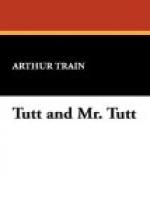Hepplewhite nodded weakly.
“I don’t know rightly what the charge is—but I don’t think he meant any harm,” he faltered.
“Then why did you have the police put him under arrest and hale him away?” challenged Mr. Tutt ferociously.
“I supposed they had to—if he came into my house,” said Mr. Hepplewhite. Then he added shamefacedly: “I know it sounds silly—but frankly I did not know that I had anything to say in the matter. If your client has been injured by my fault or mistake I will gladly reimburse him as handsomely as you wish.”
O’Brien gasped. Then he made a funnel of his hands and whispered toward the bench: “Take it away, for heaven’s sake!”
“That is all!” remarked Mr. Tutt with deep sarcasm, making an elaborate bow in the direction of Mr. Hepplewhite. “Thank you for your excellent intentions!”
A snicker followed Mr. Hepplewhite as he dragged himself back to his seat among the spectators.
He felt as though he had passed through a clothes wringer. Dimly he heard Mr. Tutt addressing the court.
“And I move, Your Honor,” the lawyer was paying, “that you take the counts for burglary in the first, second and third degrees away from the jury on the ground that there has been a complete failure of proof that my client broke into the house of this man Hepplewhite either by night or by day, or that he assaulted anybody or stole anything there, or ever intended to.”
“Motion granted,” agreed the judge. “I quite agree with you, Mr. Tutt. There is no evidence here of any breaking. In fact, the inferences are all the other way.”
“I further move that you take from the consideration of the jury the remaining count of illegally entering the house with intent to commit a crime and direct the jury to acquit the defendant for lack of evidence,” continued Mr. Tutt.
“But what was your client doing in the house?” inquired the judge. “He had no particular business in it, had he?”
“That does not make his presence a crime, Your Honor,” retorted the lawyer. “A man is not guilty of a felony who falls asleep on my haycock. Why should he be if he falls asleep in my bed?”
The judge smiled.
“We have no illegal entry statute with respect to fields or meadows, Mr. Tutt,” he remarked good-naturedly. “No, I shall be obliged to let the jury decide whether this defendant went into that house for an honest or dishonest purpose. It is clearly a proper question for them to pass upon. Proceed with your case.”
Now when, as in the case of the Hepplewhite Tramp, the chief witness for the prosecution throws up his hands and offers to repay the defendant for the wrong he has done him, naturally it is all over but the shouting.
“There is no need for me to call the defendant,” Mr. Tutt told the court, “in view of the admissions made by the last witness. I am ready to proceed with the summing up.”




